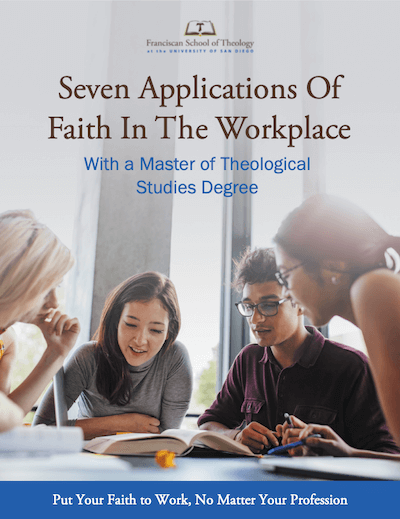In educational programs centered on faith, there can be some confusion when it comes to disciplines. Theology, divinity, ministry, religious studies — to the layperson, these may sound like versions of the same subject. However, there are fundamental differences between each discipline, as well as university degree programs structured around them.
For instance, what does a religious studies degree program entail? And what can graduates do with a degree in this subject? Read on to learn more.
What Is Religious Studies?
Religious studies is a multidisciplinary approach to studying the role religion has played in societies throughout human history. Course content can include elements of history, philosophy, literature, and sociology. Religious studies programs focus on humanity’s behavior within and reaction to religion, particularly how faith has affected humans’ perception of life, death, the afterlife, morality, and the divine.
In general, religious studies take an objective approach to world religions and faith traditions. Unlike theological studies, religious studies courses are taught without a specific faith system to structure or inform the content.
The religious studies discipline is meant to be accessible to students of any religious or cultural background. With a broad focus on faith systems across the globe, religious studies programs highlight the variety of human beliefs and experiences.
Types of Religious Studies Degrees
For those interested in a degree program that offers a comprehensive view of the world’s religions, there are several religious studies degree options available.
- Associate Degree
Typically completed in two years, a religious studies associate degree program provides introductory courses in world religions, social studies or sociology, world history, literary analysis, and philosophy. Some programs will challenge students to engage in debates about the questions inherent in religion while maintaining an objective view.
- Bachelor’s Degree
A standard religious studies bachelor’s degree program takes four years to complete and provides more in-depth coursework than an associate degree. Students take a comparative lens to world religions, analyzing how different societies incorporate religion into their art, literature, and politics, as well as the effect religion has on cross-cultural interactions. Students in this type of program will need to complete courses in other core subjects, building a well-rounded foundation for a future career in counseling, education, or business, among other industries.
- Master’s Degree
A master’s degree in religious studies provides advanced courses in ethics, religious law, doctrines, scriptures, and society. This is typically a two-year program and may prepare students to teach, enter parish support positions, or graduate to further research or advanced study. Students may choose to study the religious aspects of a specific field, such as science or history, and be encouraged to develop their own conclusions based on critical analysis and research.
Skills Developed in a Religious Studies Degree Program
Though most religious studies programs are not designed to prepare students for specific careers, the program content helps students build skills that are applicable to a wide range of professions.
Students of religious studies:
- Become familiar with traditions outside their own scope of experience
- Grow to understand and question the implications of faith
- Build strong analytical and original thinking skills
- Understand how religion impacts society, today and throughout human history
- Can develop strong, well-organized arguments on well-researched conclusions or hypotheses
- Strengthen their empathy and objectivity
Who Hires Religious Studies Graduates?
A religious studies degree is not necessarily the academic route one takes to become a clergy member, but that does not mean that graduates have limited employment options. The following types of employers, both secular and religious, may prioritize job candidates who possess a religious studies degree.
- Pre-K–12 schools
- Churches
- Law firms
- Nonprofits
- Museums
- Human services organizations
- Counseling or crisis centers
- Retreat centers
What Can You Do with a Religious Studies Degree?
The world beyond a religious studies program is a graduate’s oyster. This type of program does not limit a graduate’s professional possibilities, but it does prepare graduates for jobs that may require:
- Strong communication skills
- Ability to empathize
- An analytical or critical approach
- Objectivity and open-mindedness
- Compassion
- Emotional intelligence
Specific careers may require additional schooling beyond a religious studies degree, but graduates are often drawn to jobs like:
- Primary or secondary school educator
- Missionary
- Lecturer
- Media consultant
- Youth worker/program director
- Lawyer
- Civil servant
- Counselor
- Researcher
- Diplomat
- Writer
- Aid worker
- Activist
- Nonprofit leader
- Historian or archivist
- Museum curator
- Art critic
- Further academic study
Religious Studies Career Resources
As with many fields, networking may be a religious studies graduate’s best source of professional connections and career leads. Professional organizations, alumni networks, and faculty advisors are excellent resources for religious studies graduates entering the job market.
Some organizations to bookmark include:
- African Association for the Study of Religions
A group that provides teaching, publication, and research opportunities to those interested in the historical relevance of religion in Africa.
- American Academy of Religion (AAR)
A professional association specifically for educators who focus on the study of religion.
- Association for the Sociology of Religion
A membership group that promotes sociological research of religion through grants, awards competitions, and annual meetings.
- Canadian Corporation for Studies in Religion
A collective of Canadian academic societies who publish a journal for religious scholars in English and French.
- International Association for the History of Religions
A group that connects religious scholars from around the world to contribute to the ongoing comparative study of religion.
- North American Association for the Study of Religion
An association that offers conferences for clergy and religious scholars interested in the historical, social, and critical approaches to religion.
- Religious Education Association
An organization with a mission to connect religious studies professionals with opportunities for continuing education and networking.
Similar Career Paths
For those who have slightly different professional goals from the ones listed above, there are similar degree options that may provide a more suitable academic foundation.
- Master of Theological Studies
Unlike the broad, objective approach of religious studies, theology is the study of religion from within a specific faith. Considered an academic degree, a Master of Theological Studies (MTS) can prepare students to teach, work, or conduct research within both secular and religious contexts. Graduates with an MTS degree can teach at a religious school or community college, and many enter counseling or legal professions. Like religious studies, theological studies does not lead to a specific career path, nor is it necessarily the track for prospective clergy members.
- Master of Arts in Theology
A Master of Arts (MA) in theology serves as an ideal foundation for teaching at the secondary or two-year college level, or for further doctoral work. Like the MTS, this is an academically rigorous theological program, but not one that necessarily prepares graduates for ordination.
See overview: University of San Diego – Master of Theological Studies
If you’re unsure which academic track will help you achieve your professional and personal goals, the best way to learn more is by talking to a program advisor. The Franciscan School of Theology at the University of San Diego offers both MTS (on campus and online) and MA degree programs, and advisors are always on hand to provide more information. Don’t hesitate to reach out with any questions.



![What is Theological Studies? [+ Degree Comparison]](https://onlinedegrees.sandiego.edu/wp-content/uploads/2022/01/what-is-theological-studies.jpg)
